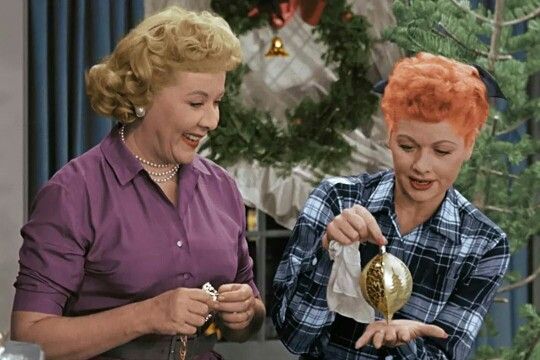
More than seventy years after it first aired, I Love Lucy remains one of the most beloved and influential television shows in history. What began as a simple domestic comedy in 1951 turned into a revolutionary blend of humor, heart, and technical innovation that forever changed the landscape of entertainment. Behind the laughter was a team of visionaries—most notably Lucille Ball and Desi Arnaz—whose creativity and courage shaped the very foundation of modern television.
A Show That Changed Everything
When I Love Lucy debuted on CBS, television was still in its infancy. Few could have imagined that a sitcom about a quirky redhead and her Cuban bandleader husband would capture the hearts of millions and become a cultural phenomenon. But that’s exactly what it did.
Lucille Ball’s character, Lucy Ricardo, was a spirited housewife with big dreams and even bigger mishaps. She wanted to perform, to be part of the excitement her husband Ricky enjoyed on stage—but life, luck, and a touch of chaos always got in her way. What made Lucy so relatable was her authenticity. She wasn’t perfect; she failed often, but she failed with flair. Every episode delivered laughter rooted in human truth, making audiences feel that even the most ridiculous situations carried a hint of reality.
Love and Partnership On and Off Screen
One of the most fascinating aspects of I Love Lucy was how much of it reflected Lucille Ball and Desi Arnaz’s real-life relationship. The couple’s love, challenges, and cultural differences found their way into the scripts—creating a chemistry that couldn’t be faked.
Desi’s character, Ricky Ricardo, often clashed with Lucy’s wild ideas, but beneath the comedy lay genuine affection and respect. Their relationship broke boundaries for its time, portraying an interracial marriage on primetime television when such representation was almost unheard of.
Behind the scenes, Ball and Arnaz’s partnership was even more groundbreaking. They co-founded Desilu Productions, a company that would go on to produce not only I Love Lucy but also iconic series like Star Trek and Mission: Impossible. Together, they were more than actors—they were pioneers who combined creativity with business acumen to shape the industry’s future.
Innovation That Redefined Television
The success of I Love Lucy didn’t just come from clever writing or strong performances. It came from innovation.
Ball and Arnaz were among the first to film a sitcom before a live studio audience using a three-camera setup. This allowed editors to capture multiple angles at once, preserving the energy of a live performance while maintaining high production quality. The technique revolutionized television production—and remains standard practice for sitcoms today.
The show was also filmed on 35mm film, ensuring better picture quality and allowing for reruns long before the idea of “syndication” became common. This technical foresight not only made I Love Lucy immortal but also reshaped the economics of the entertainment industry.
The Golden Age of Television
I Love Lucy didn’t just entertain; it defined what many consider the Golden Age of Television. It proved that television could be smart, emotionally resonant, and technically sophisticated.
The show’s writing, led by Jess Oppenheimer, Madelyn Pugh, and Bob Carroll Jr., blended slapstick with wit, and the performances elevated every script into a work of art. Episodes like “Lucy Does a TV Commercial” and “Job Switching” are still studied today for their comedic timing and structure.
Ball’s fearless approach to physical comedy—whether stomping grapes or juggling chocolates—set a new standard for women in comedy. She proved that humor wasn’t just a man’s game; it was a universal language of joy and rebellion.
A Legacy That Still Inspires
Generations later, I Love Lucy continues to inspire creators across film and television. Modern sitcoms like Friends, Seinfeld, and The Office owe part of their DNA to the rhythm and authenticity Lucy introduced.
Comedians such as Tina Fey, Amy Poehler, and Carol Burnett have all cited Lucille Ball as a trailblazer who showed that women could lead, create, and command laughter without apology. Meanwhile, producers and directors continue to study Lucy for its innovative storytelling and production design.
Even streaming platforms today keep the show alive, introducing its timeless humor to younger audiences who find its charm as fresh as ever.
More Than Laughter
At its core, I Love Lucy is more than a comedy—it’s a story about love, ambition, and the courage to be different. Lucille Ball and Desi Arnaz weren’t afraid to take risks, both personally and professionally. They pushed against the limits of what television could be and, in doing so, built a legacy that outlived them both.
Every laugh track, every sitcom family, every rerun owes a little debt to that energetic redhead and her visionary partner.
Conclusion
Inside I Love Lucy lies the essence of why television matters: its power to connect people through laughter, to mirror our lives with tenderness and humor, and to inspire generations to dream bigger. Lucille Ball and Desi Arnaz didn’t just make America laugh—they changed the way the world told stories.
Their creation remains a beacon of creativity, a love letter to risk-takers everywhere, and a reminder that sometimes, the boldest innovations begin with a simple desire—to make people smile.
